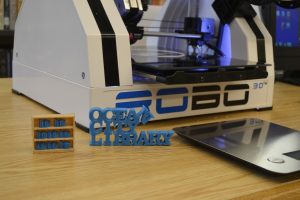
OCEAN CITY – Worcester County Library patrons will have access to a new piece of technology next week as four branches now have 3D printers.
Thanks to a grant from the Eastern Shore Regional Library, the Ocean City, Ocean Pines, Pocomoke and Snow Hill branches of the Worcester County Library received 3D printers this month. The printers will be available for the public to use starting Dec. 1.
“Libraries are not only places where people can come to learn but now are becoming places where people can create and invent,” said Jennifer Ranck, director of the Worcester County Library.
The libraries in Pocomoke, Snow Hill, Ocean City and Ocean Pines now each have a “ROBO 3D R1 Plus” printer. Ranck says the Berlin branch is too small for a 3D printer but that patrons there will have one in the new facility set to be built next year.
“The Berlin branch does not have one because space is very limited in the current building,” she said. “We will certainly address that in the new building.”
She said plans for the new facility include a designated “maker space” that will house a 3D printer as well as other technology to encourage learning and creativity.
Employees at the libraries that now have the 3D printers have spent the past several weeks learning how to use the technology.
“This is new to everybody,” said Brittany Herz Glenn, branch manager of the Ocean City library.
She says patrons of her library will have access to the printer beginning Dec. 1. While she hopes eventually they’ll be able to print out items they’ve designed themselves, initially the library’s printer will only be capable of printing through www.thingiverse.com. The website is home to an array of digital designs that can be turned into physical objects using 3D printers. Employees at the Ocean City branch have used its designs to print everything from cell phone stands to snowflake ornaments. They even printed a miniature bookshelf and tiny books to fill it.
The library’s basic printing material is blue or white plastic although it does stock wood, carbon fiber and glow-in-the-dark filament as well. Patrons are charged 10 cents a gram for items printed using the basic material and 25 cents a gram for things made with the more specialized material.
“After they print with the filament we weigh it,” Herz Glenn said. “Everything’s done by weight.”
Printing can be slow, with some items taking just minutes while others take several hours. Librarians will add patrons’ projects to a queue to print.
“As we get more people using it we’ll be able to experiment more,” she said. “Hopefully we get some cool requests.”
Herz Glenn believes 3D printers will be used more and more in the future as people realize what they can do with them. She says soon people will be printing little things like the backs to TV remotes when they lose them rather than going to the store to purchase another.
“I think there’s a niche,” she said. “These things are going to become more and more popular.”

